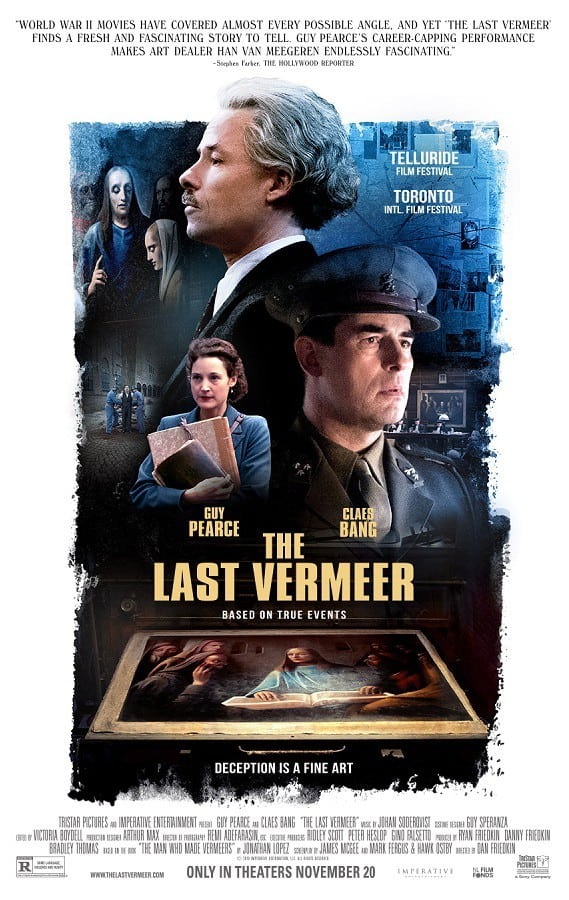The Last Vermeer, 2020.
Direct by Dan Friedkin.
Starring Claes Bang, Guy Pearce, Roland Møller, Vicky Krieps, Matt Beauman-Jones, Paul Bentall, August Diehl, Richard Dillane, Olivia Grant, Marie Bach Hansen, Andrew Havill, Tom Mulheron, Simon Paisley Day, Oliver Ryan, and Joakim Skarli.
SYNOPSIS:
An artist is suspected of selling a valuable painting to the Nazis, but there is more to the story than meets the eye.
If you’re like me and beginning to suspect that Claes Bang has signed some strange contract where he stars exclusively in films about art (we’ve already had The Burnt Orange Heresy right before the world shut down, and both of these movies are from Sony no less), it should be noted that him appearing in The Last Vermeer does make more sense beyond the subject matter. The Last Vermeer actually rejoins the underappreciated actor with his The Square producer turned first-time director Dan Friedkin, both of whom apparently wanted to further explore art and its history.
Taking place three weeks after the death of Hitler, The Last Vermeer sees Dutch Jew Captain Joseph Piller (Claes Bang) of the Resistance uncovering lost art bought for by the Nazi regime. His investigation into how it landed in the possession of a high-ranking Nazi officer leads him to an eccentric failed artist turned notable dealer Han van Meergren (Guy Pearce, appropriately making an enigma out of this real-life personality) who denies connections to the Nazi party despite clues indicating otherwise. The plot thickens as an uncovered photo finds the same Nazi officer (apparently he had wanted to own more culturally defining paintings than Hitler, happy to fork over an exuberant amount of cash and overpaying for Johannes Vermeer works in the process) that had bought the ‘Christ with the Adulteress’ painting from the renowned eponymous artist.
Joseph Piller also has to deal with a shady Ministry of Justice getting in the way of his investigation (or the Ministry of Convenient Justice as he calls it), and his fractured family life as a result of World War II that forced him to join the Resistance to avoid unspeakable fates. Meanwhile, his wife became a spy for the Allied forces, earning the trust and sleeping with high-ranking Nazis for information to exchange. The destitute and collapsed state of their homeland also plays a part, capturing bleak visuals expressing that something irreplaceable here was lost other than valued paintings.
Director Dan Friedkin is examining what it takes to move on from such suffering, without lingering on the family dynamics for too long. If anything, Joseph’s quest sometimes feels like growing obsession since the aftermath of the war has left him nothing else. Even the notion of performing his job thoroughly proves to be difficult given everything standing in his way.
The mystery of Han van Meergren is resolved only halfway into the movie, which is a good thing since the film already tries to squeeze a bit too much drama out of the investigation, but a bit jarring since Vicky Krieps’s assistant character to Joseph randomly figures out a critical detail out of nowhere. This does leave the proceedings to go in a new direction centered on outrage and courtroom drama. A combined screenplay effort from James McGee, Mark Fergus, and Hawk Ostby (adapting the Jonathan Lopez novel The Man Who Made Vermeers) renders both halves of the movie primarily built on the serviceable and nuanced acting more than anything, but the back half does pose some interesting questions about art, critics, forgery, and how meaningful and valuable all of it really is. Without spoiling, by the end of The Last Vermeer, you get the feeling that major components of the industry are a pretentious sham.
The provocative nature of the narrative does enough to make up for the emotional distance and dryness of the presentation, but things don’t really pick up until the urgency of a man’s life at stake comes into question. The Last Vermeer likely won’t be the last film starring Claes Bang that takes an interest in the art world, and it’s neither the best nor worst of them so far. It’s informative and holds one’s attention with enough of a likable cast and intriguing climactic reveals to recontextualize what we have been looking at the entire time. In that sense, it’s almost like a cinematic painting.
Flickering Myth Rating – Film: ★ ★ ★ / Movie: ★ ★ ★
Robert Kojder is a member of the Chicago Film Critics Association and the Critics Choice Association. He is also the Flickering Myth Reviews Editor. Check here for new reviews, follow my Twitter or Letterboxd, or email me at MetalGearSolid719@gmail.com















